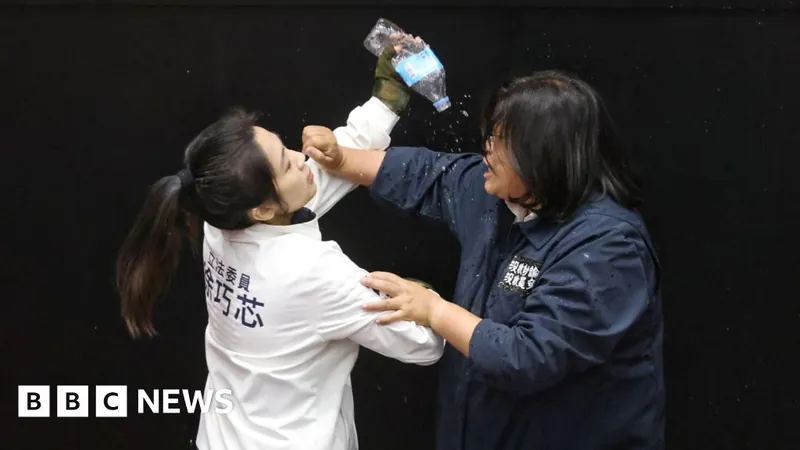
Taiwan's Great Recall: A Tipping Point in Democracy or a Dangerous Divide?
2025-07-24
Author: Yan
Tensions in Taiwan have reached a boiling point as citizens prepare for a historic vote aimed at ousting lawmakers viewed as too friendly with China. Dubbed the "Great Recall," this unprecedented event is poised to shake the very foundations of Taiwanese democracy.
Deng Pu, a 39-year-old photographer, became an unlikely activist after witnessing what he sees as undemocratic maneuvers by lawmakers and escalating Chinese influence in parliament. His frustration fueled participation in massive protests last year, and now, he has joined numerous civic groups pushing the recall initiative.
This Saturday, voters will decide whether to remove over two dozen Kuomintang (KMT) lawmakers, stirring the political pot even further in a country already divided along party lines.
The Political Landscape: A Divided House
The political tension can be traced back to last January's elections, where President William Lai of the Democratic Progressive Party (DPP) assumed office, while opposition KMT notably dominated the Legislative Yuan. This shift has led to threats against DPP initiatives deemed essential for Taiwan's sovereignty.
Protests erupted in response to controversial legislation, including attempts to restrict the constitutional court's powers and elevate thresholds for holding recall votes. Many see these actions as a tactic to deepen the KMT's grip on power while stifling the DPP.
The Bluebird Movement: Rising Voices Against Silence
In May 2024, the Bluebird movement emerged, rallying thousands who fear Beijing's influence on KMT leaders. Suspicion peaked after a group of KMT lawmakers visited China, further inciting the public to question their loyalties.
With petitions already qualifying for a recall vote on 31 KMT lawmakers, the stakes are incredibly high. If even a handful are successfully ousted, the DPP could eventually gain the legislative majority.
An All-Out Battle for Democracy
Voter turnout is critical during the Great Recall, making grassroots campaigning vital. As Deng and his team canvass neighborhoods, handing out promotional material urging residents to vote, they face both support and resistance.
Despite potential setbacks—such as a possible KMT re-election in by-elections—the rallying cry remains: "We must reclaim our democracy!" The DPP, initially cautious, has now thrown its support behind the recall effort, leaving many questioning the party’s motives.
Echoes of History: A Polarized Society
Anti-recall demonstrations by the KMT and allies have drawn thousands, with opponents accusing the DPP of manipulating public sentiment. Protests have escalated to extreme rhetoric, referencing Taiwan's dark past under authoritarian rule.
As the arguments become increasingly heated, analysts warn that the Great Recall could become a catalyst for profound changes in political engagement in Taiwan, whether it reinforces current divisions or fosters future collaboration.
Future Implications: The Stakes are High
Political experts suggest this event could redefine democratic accountability in Taiwan. If successful, it could signal to politicians that public sentiment must be heeded, while failure may embolden them to push limits.
However, the broader implications for civil society and political discourse remain crucial. With both sides entrenched in their beliefs, the outcome of the Great Recall may either bridge gaps or deepen divides, dictating the future course of Taiwan's democracy.


 Brasil (PT)
Brasil (PT)
 Canada (EN)
Canada (EN)
 Chile (ES)
Chile (ES)
 Česko (CS)
Česko (CS)
 대한민국 (KO)
대한민국 (KO)
 España (ES)
España (ES)
 France (FR)
France (FR)
 Hong Kong (EN)
Hong Kong (EN)
 Italia (IT)
Italia (IT)
 日本 (JA)
日本 (JA)
 Magyarország (HU)
Magyarország (HU)
 Norge (NO)
Norge (NO)
 Polska (PL)
Polska (PL)
 Schweiz (DE)
Schweiz (DE)
 Singapore (EN)
Singapore (EN)
 Sverige (SV)
Sverige (SV)
 Suomi (FI)
Suomi (FI)
 Türkiye (TR)
Türkiye (TR)
 الإمارات العربية المتحدة (AR)
الإمارات العربية المتحدة (AR)